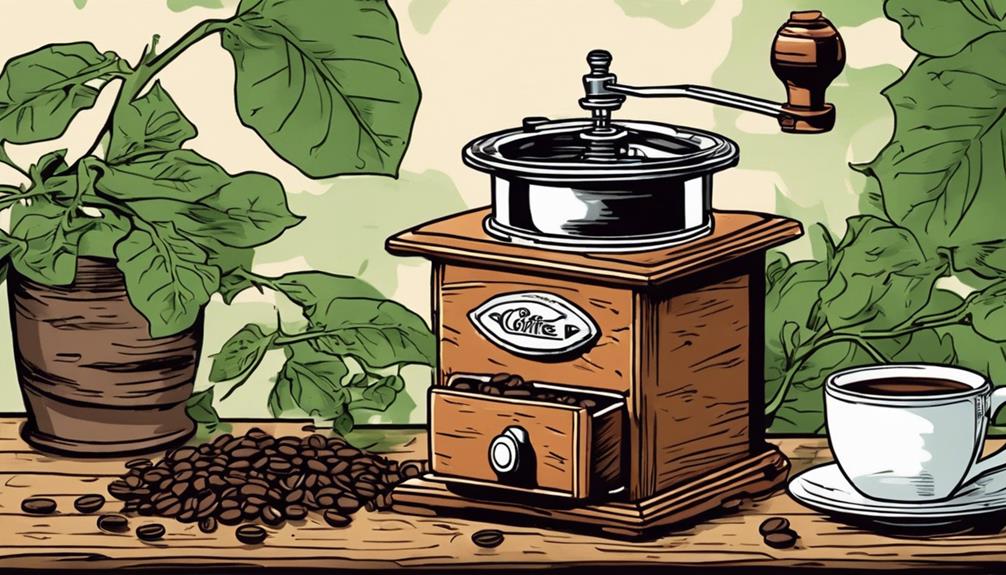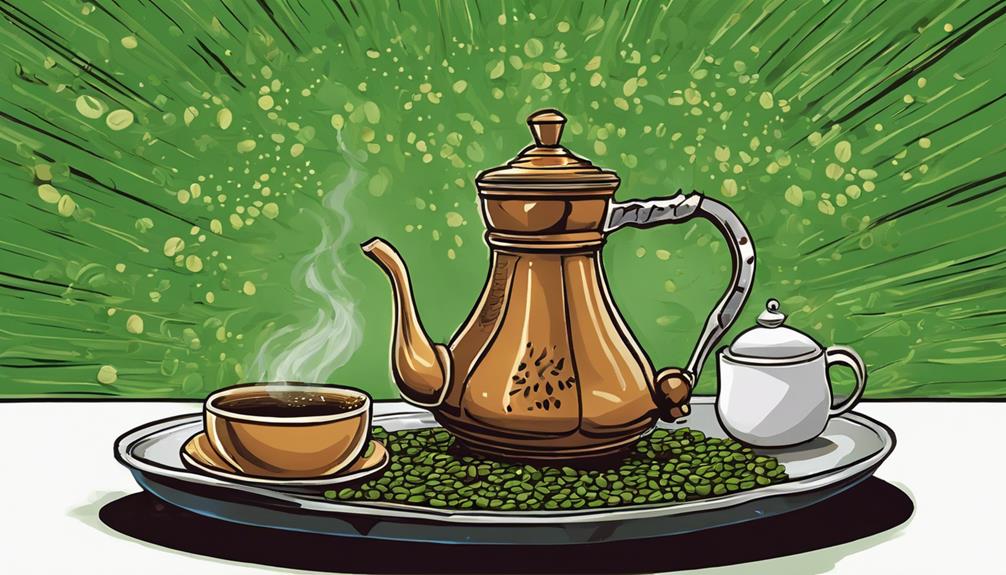To increase your tolerance to coffee without experiencing jitters, it is important to understand the effects of caffeine and implement some strategies. Be aware of symptoms like shaky hands and rapid heartbeat. Stay hydrated to help eliminate excess caffeine from your system and eat fiber or protein-rich foods. Eating balanced meals and getting enough sleep are also key factors in building tolerance. Drinking water and herbal teas can help reduce jitters. Gradually decreasing your caffeine intake can help prevent withdrawal symptoms. Practicing mindfulness can benefit your mental health. By following these steps, you can improve your tolerance for your daily cup of coffee. Regular exercise can also help regulate your sensitivity to caffeine and reduce jitters. It is crucial to pay attention to your body and avoid consuming too much caffeine in a short period of time to prevent stomach issues. Incorporating stress-reducing activities such as yoga or meditation can also aid in developing a healthier coffee tolerance.
Key Takeaways
- Gradually reduce coffee intake to build tolerance.
- Stay hydrated with water to manage caffeine effects.
- Eat balanced meals to stabilize energy levels.
- Engage in physical activity to reduce jitters.
- Practice mindfulness techniques for mental well-being.
Understanding Caffeine Jitters and Symptoms
To comprehend the effects of caffeine jitters, it's vital to recognize the symptoms they manifest in your body. When caffeine jitters kick in, you may experience shaky hands, a racing heart, and an upset stomach. These physical manifestations are a result of caffeine blocking adenosine receptors in your brain, leading to increased alertness and energy.
Alongside these symptoms, insomnia can also plague you, making it challenging to rest or sleep. These jitters typically last between 3-5 hours, but for some individuals, the effects may linger for up to 12 hours.
Understanding these symptoms is pivotal in managing the impact of caffeine on your body. By being aware of how caffeine affects you personally, you can take steps to mitigate the jitters. Factors like age, metabolism, medication, and genetics play a role in how intensely caffeine affects you.
Managing and Preventing Caffeine Jitters

Consider hydrating with water as a simple yet effective way to flush out excess caffeine from your system and alleviate jitters.
To manage and prevent caffeine jitters effectively, try incorporating these strategies:
- Eat fiber or protein-rich foods: These can help slow down caffeine absorption, reducing the intensity of jitters.
- Engage in physical activity: Take a brisk walk or do some light exercise to decrease anxiety levels and counteract the effects of excess caffeine.
- Practice deep breathing exercises: Find a quiet spot to relax and focus on deep breathing to calm your nervous system and alleviate caffeine jitters.
Additionally, sipping on herbal teas like chamomile or peppermint can provide a soothing effect on your body, helping to ease the symptoms of caffeine jitters.
Adopting Healthier Habits

You can start adopting healthier habits by focusing on balanced meals that include proteins, healthy fats, and complex carbs to manage caffeine jitters effectively.
Remember to stay hydrated throughout the day by drinking at least eight 8-ounce glasses of water to help your body flush out excess caffeine and maintain balance.
Establishing a consistent sleep schedule, aiming for 7-9 hours of quality sleep per night, can also play an essential role in supporting your body's ability to handle caffeine intake without experiencing jitters.
Balanced Meal Importance
Incorporating balanced meals into your daily routine plays an essential role in managing caffeine jitters effectively. When planning your meals, aim to include proteins, healthy fats, and complex carbs to help stabilize your energy levels and minimize the side effects of caffeine.
Here's how these components can benefit you:
- Proteins and Healthy Fats: Slowing down caffeine absorption, these nutrients can reduce the risk of jitters and provide sustained energy throughout the day.
- Complex Carbs: Consuming complex carbs alongside caffeine intake can prevent energy spikes and crashes, offering a more balanced energy level.
- Fiber-Rich Foods: Including fiber-rich foods in your diet supports the body's ability to metabolize caffeine efficiently, assisting in a smoother and more controlled release of energy.
Hydration for Control
Staying adequately hydrated plays an important role in managing caffeine intake and controlling its effects on your body. Hydrating with water helps flush out excess caffeine from your system, aiding in reducing the jitters and restlessness often associated with high caffeine consumption.
In addition, consuming fiber or protein-rich foods alongside your caffeinated beverages can slow down the absorption of caffeine, leading to a more gradual and sustained release of energy.
Engaging in physical activity, such as going for a walk, not only helps in reducing anxiety but also combats the jittery feelings caused by caffeine. Moreover, practicing deep breathing exercises can promote relaxation and alleviate the jitters induced by caffeine consumption.
Remember that finding moments of rest in a quiet environment can also help reduce overstimulation and jitteriness associated with excess caffeine. By incorporating these hydration and relaxation techniques, you can better control the impact of caffeine on your body.
Sleep Schedule Impact
To enhance your tolerance to caffeine and manage its effects, consider the impact of your sleep schedule on your overall well-being and energy levels. Ensuring you get 7-9 hours of quality sleep each night can significantly regulate your energy levels and decrease your reliance on caffeine.
Disrupted sleep patterns can lead to increased caffeine dependency as you may use it to combat fatigue. Prioritizing a healthy sleep routine is essential for managing stress, enhancing cognitive function, and stabilizing your mood, ultimately reducing the desire for excessive caffeine intake.
Adequate sleep not only promotes overall well-being but also helps in improving focus and decreasing the need for stimulants like caffeine. By maintaining a consistent sleep schedule and prioritizing quality rest, you can positively impact your energy levels, reduce caffeine dependency, and support your overall health and well-being.
Staying Hydrated

To build your coffee tolerance without experiencing jitters, staying hydrated is key. Drinking water helps your body eliminate excess caffeine, while also promoting overall health.
Ensuring you meet your daily recommended water intake can aid in reducing the need for stimulants and maintaining a balanced caffeine tolerance.
Hydration for Caffeine Tolerance
For promoting efficient metabolism of caffeine and reducing its impact on your body, staying hydrated is essential. Adequate hydration plays an essential role in managing caffeine tolerance effectively.
Here's how staying hydrated can help you build your coffee tolerance without experiencing jitters:
- Flush Out Excess Caffeine: Drinking water assists in flushing out excess caffeine from your system, potentially reducing the likelihood of experiencing jitters.
- Support Overall Health: Hydrating adequately supports overall health and well-being, minimizing the negative effects associated with the development of caffeine tolerance.
- Water-Rich Foods: Consuming water-rich foods like fruits and vegetables can contribute to your hydration levels, aiding in managing caffeine tolerance while providing essential nutrients for peak bodily functions.
Water Intake Importance
Staying adequately hydrated, especially through water intake, is key for managing caffeine tolerance and minimizing its effects on your body. Hydration plays a vital role in flushing out caffeine from your system, reducing the likelihood of experiencing caffeine jitters.
Drinking a minimum of eight 8-ounce glasses of water daily is essential for staying hydrated and aiding in the elimination of caffeine. It's important to adjust your water intake based on factors such as age, weight, activity level, and climate to optimize your hydration levels effectively.
Incorporating water-rich foods like fruits and vegetables into your diet can also contribute to your overall hydration. By staying hydrated, you can reduce the dependency on stimulants like caffeine and better manage the associated jitters.
Duration and Remedies for Caffeine Jitters

How long do caffeine jitters typically last, and what remedies can help alleviate them?
Caffeine jitters can linger for 3-5 hours, occasionally extending up to 12 hours. Factors like age and liver function influence the half-life of caffeine, affecting how long the jitters persist.
To combat these jitters, consider the following remedies:
- Supplements: Magnesium supplements can aid in reducing and alleviating caffeine jitters.
- Hydration: Drinking plenty of water helps flush out excess caffeine from your system, potentially decreasing jitters.
- Herbal Teas: Consuming herbal teas such as chamomile or peppermint can have a calming effect on the nervous system, providing relief from caffeine-induced jitters.
Foods to Avoid and Developing Tolerance

To manage caffeine jitters effectively and cultivate tolerance, it's crucial to be mindful of the foods you consume and how they can impact your caffeine sensitivity. Avoid sugary and highly processed foods as they can exacerbate caffeine effects and jitteriness. Opt for balanced meals incorporating proteins, fats, and complex carbs to help regulate caffeine jitters and assist in tolerance development.
Remember, even as you build tolerance to caffeine, it may not eliminate the possibility of experiencing jitters, so monitor your consumption carefully.
When working on developing tolerance, focus on gradually reducing your caffeine intake to minimize withdrawal symptoms and enhance your tolerance effectively. Be attentive to all sources of caffeine, including dark chocolate, to make sure you're managing your caffeine intake appropriately.
Mental Health and Mindfulness

Embracing mindfulness practices can greatly enhance your mental well-being and personal growth. Mindful practices like forgiveness and letting go of hatred can benefit personal growth and mental well-being.
Techniques for releasing negative emotions and managing stress can be found in mindfulness practices. The Calm app offers tools and resources for individuals looking to improve their mental health and reduce anxiety.
Incorporating deep breathing exercises can promote relaxation and reduce feelings of anxiety and stress. Engaging in activities like meditation, yoga, or walking can help enhance mindfulness and improve mental clarity.
Frequently Asked Questions
How Do You Stop Caffeine From Making You Jittery?
To stop caffeine from making you jittery, monitor intake below 400 mg daily. Limit individual servings to 200 mg. Smaller doses like 75 mg still offer benefits. Watch timing to avoid sleep disruption. Consider non-caffeine methods for focus.
How Can I Get Caffeine Without Jitters?
To get caffeine without jitters, try alternatives like green tea, decaf coffee, or mushroom coffee for sustained energy. Opt for chicory herbal coffee or fruit-infused water for flavorful, caffeine-free options. Experiment and find what works best for you!
How Can I Improve My Caffeine Tolerance?
To improve your caffeine tolerance, gradually decrease daily intake, cycle caffeine-free periods, and monitor servings under 200 mg. Explore non-caffeine energy sources and consult professionals for personalized guidance. Experiment and find what works best for you.
How to Drink Coffee Without Building Tolerance?
To drink coffee without building tolerance, limit your daily caffeine intake to 400 mg, switch to decaf or herbal teas occasionally, try smaller coffee sizes, take breaks or caffeine-free days, and monitor consumption closely.
Conclusion
So next time you reach for that cup of coffee, remember to be mindful of your caffeine intake and how it affects your body.
By adopting healthier habits, staying hydrated, and being aware of your mental health, you can build up your tolerance to caffeine without experiencing those pesky jitters.
So go ahead, enjoy your coffee without the worry of feeling jittery – your body will thank you!









